- Home
- Cao Xueqin
The Golden Days Page 5
The Golden Days Read online
Page 5
iii. Diphthongs
ai like the sound in English lie, high, mine (e.g. Dai-yu)
ao like the sound in how or bough (e.g. Bao-yu)
ei like the sound in day or mate (e.g. Bei-jing)
ou like the sound in old or bowl (e.g. Gou-er)
The syllable er, sometimes found as the second element in names, is a peculiarity of the Pekingese dialect which lies outside this system. It sounds somewhat like the word err pronounced with a broad West Country accent.
Chapter 1
Zhen Shi-yin makes the Stone’s
acquaintance in a dream
And Jia Yu-cun finds that poverty is not incompatible
with romantic feelings
GENTLE READER,
What, you may ask, was the origin of this book ?
Though the answer to this question may at first seem to border on the absurd, reflection will show that there is a good deal more in it than meets the eye.
Long ago, when the goddess Nü-wa was repairing the sky, she melted down a great quantity of rock and, on the Incredible Crags of the Great Fable Mountains, moulded the amalgam into thirty-six thousand, five hundred and one large building blocks, each measuring seventy-two feet by a hundred and forty-four feet square. She used thirty-six thousand five hundred of these blocks in the course of her building operations, leaving a single odd block unused, which lay, all on its own, at the foot of Greensickness Peak in the aforementioned mountains.
Now this block of stone, having undergone the melting and moulding of a goddess, possessed magic powers. It could move about at will and could grow or shrink to any size it wanted. Observing that all the other blocks had been used for celestial repairs and that it was the only one to have been rejected as unworthy, it became filled with shame and resentment and passed its days in sorrow and lamentation.
One day, in the midst of its lamentings, it saw a monk and a Taoist approaching from a great distance, each of them remarkable for certain eccentricities of manner and appearance. When they arrived at the foot of Greensickness Peak, they sat down on the ground and began to talk. The monk, catching sight of a lustrous, translucent stone – it was in fact the rejected building block which had now shrunk itself to the size of a fan-pendant and looked very attractive in its new shape – took it up on the palm of his hand and addressed it with a smile:
‘Ha, I see you have magical properties I But nothing to recommend you. I shall have to cut a few words on you so that anyone seeing you will know at once that you are something special. After that I shall take you to a certain
brilliant
successful
poetical
cultivated
aristocratic
elegant
delectable
luxurious
opulent
locality on a little trip’.
The stone was delighted.
‘What words will you cut? Where is this place you will take me to ? I beg to be enlightened.’
‘Do not ask,’ replied the monk with a laugh.’ You will know soon enough when the time comes.’
And with that he slipped the stone into his sleeve and set off at a great pace with the Taoist. But where they both went to I have no idea.
Countless aeons went by and a certain Taoist called Vanitas in quest of the secret of immortality chanced to be passing below that same Greensickness Peak in the Incredible Crags of the Great Fable Mountains when he caught sight of a large stone standing there, on which the characters of a long inscription were clearly discernible.
Vanitas read the inscription through from beginning to end and learned that this was a once lifeless stone block which had been found unworthy to repair the sky, but which had magically transformed its shape and been taken down by the Buddhist mahasattva Impervioso and the Taoist illuminate Mysterioso into the world of mortals, where it had lived out the life of a man before finally attaining nirvana and returning to the other shore. The inscription named the country where it had been born, and went into considerable detail about its domestic life, youthful amours, and even the verses, mottoes and riddles it had written. All it lacked was the authentication of a dynasty and date. On the back of the stone was inscribed the following quatrain:
Found unfit to repair the azure sky
Long years a foolish mortal man was I.
My life in both worlds on this stone is writ:
Pray who will copy out and publish it?
From his reading of the inscription Vanitas realized that this was a stone of some consequence. Accordingly he addressed himself to it in the following manner:
‘Brother Stone, according to what you yourself seem to imply in these verses, this story of yours contains matter of sufficient interest to merit publication and has been carved here with that end in view. But as far as I can see (a) it has no discoverable dynastic period, and (b) it contains no examples of moral grandeur among its characters – no statesmanship, no social message of any kind. All I can find in it, in fact, are a number of females, conspicuous, if at all, only for their passion or folly or for some trifling talent or insignificant virtue. Even if I were to copy all this out, I cannot see that it would make a very remarkable book.’
‘Come, your reverence,’ said the stone (for Vanitas had been correct in assuming that it could speak) ‘must you be so obtuse? All the romances ever written have an artificial period setting – Han or Tang for the most part. In refusing to make use of that stale old convention and telling my Story of the Stone exactly as it occurred, it seems to me that, far from depriving it of anything, I have given it a freshness these other books do not have.
‘Your so-called “historical romances”, consisting, as they do, of scandalous anecdotes about statesmen and emperors of bygone days and scabrous attacks on the reputations of long dead gentlewomen, contain more wickedness and immorality than I care to mention. Still worse is the “erotic novel”, by whose filthy obscenities our young folk are all too easily corrupted. And the “boudoir romances”, those dreary stereotypes with their volume after volume all pitched on the same note and their different characters undistinguishable except by name (all those ideally beautiful young ladies and ideally eligible young bachelors) – even they seem unable to avoid descending sooner or later into indecency.
‘The trouble with this last kind of romance is that it only gets written in the first place because the author requires a framework in which to show off his love-poems. He goes about constructing this framework quite mechanically, beginning with the names of his pair of young lovers and invariably adding a third character, a servant or the like, to make mischief between them, like the chou in a comedy.
‘What makes these romances even more detestable is the stilted, bombastic language – inanities dressed in pompous rhetoric, remote alike from nature and common sense and teeming with the grossest absurdities.
‘Surely my “number of females”, whom I spent half a lifetime studying with my own eyes and ears, are preferable to this kind of stuff? I do not claim that they are better people than the ones who appear in books written before my time; I am only saying that the contemplation of their actions and motives may prove a more effective antidote to boredom and melancholy. And even the inelegant verses with which my story is interlarded could serve to entertain and amuse on those convivial occasions when rhymes and riddles are in demand.
‘All that my story narrates, the meetings and partings, the joys and sorrows, the ups and downs of fortune, are recorded exactly as they happened. I have not dared to add the tiniest bit of touching-up, for fear of losing the true picture.
‘My only wish is that men in the world below may sometimes pick up this tale when they are recovering from sleep or drunkenness, or when they wish to escape from business worries or a fit of the dumps, and in doing so find not only mental refreshment but even perhaps, if they will heed its lesson and abandon their vain and frivolous pursuits, some small arrest in the deterioration of their vital forces. What does your rever
ence say to that?’
For a long time Vanitas stood lost in thought, pondering this speech. He then subjected the Story of the Stone to a careful second reading. He could see that its main theme was love; that it consisted quite simply of a true record of real events; and that it was entirely free from any tendency to deprave and corrupt. He therefore copied it all out from beginning to end and took it back with him to look for a publisher.
As a consequence of all this, Vanitas, starting off in the Void (which is Truth) came to the contemplation of Form (which is Illusion); and from Form engendered Passion; and by communicating Passion, entered again into Form; and from Form awoke to the Void (which is Truth). He therefore changed his name from Vanitas to Brother Amor, or the Passionate Monk, (because he had approached Truth by way of Passion), and changed the title of the book from The Story of the Stone to The Tale of Brother Amor.
Old Kong Mei-xi from the homeland of Confucius called the book A Mirror for the Romantic. Wu Yu-feng called it A Dream of Golden Days. Cao Xueqin in his Nostalgia Studio worked on it for ten years, in the course of which he rewrote it no less than five times, dividing it into chapters, composing chapter headings, renaming it The Twelve Beauties of Jinling, and adding an introductory quatrain. Red Inkstone restored the original title when he recopied the book and added his second set of annotations to it.
This, then, is a true account of how The Story of the Stone came to be written.
Pages full of idle words
Penned with hot and bitter tears:
All men call the author fool;
None his secret message hears.
The origin of The Story of the Stone has now been made clear. The same cannot, however, be said of the characters and events which it recorded. Gentle reader, have patience! This is how the inscription began:
Long, long ago the world was tilted downwards towards the south-east; and in that lower-lying south-easterly part of the earth there is a city called Soochow; and in Soochow the district around the Chang-men Gate is reckoned one of the two or three wealthiest and most fashionable quarters in the world of men. Outside the Chang-men Gate is a wide thorough fare called Worldly Way; and somewhere off Worldly Way is an area called Carnal Lane. There is an old temple in the Carnal Lane area which, because of the way it is bottled up inside a narrow cul-de-sac, is referred to locally as Bottle-gourd Temple. Next door to Bottle-gourd Temple lived a gentleman of private means called Zhen Shi-yin and his wife Feng-shi, a kind, good woman with a profound sense of-decency and decorum. The household was not a particularly wealthy one, but they were nevertheless looked up to by all and sundry as the leading family in the neighbourhood.
Zhen Shi-yin himself was by nature a quiet and totally unambitious person. He devoted his time to his garden and to the pleasures of wine and poetry. Except for a single flaw, his existence could, indeed, have been described as an idyllic one. The flaw was that, although already past fifty, he had no son, only a little girl, just two years old, whose name was Ying-lian.
Once, during the tedium of a burning summer’s day, Shi-yin was sitting idly in his study. The book had slipped from his nerveless grasp and his head had nodded down onto the desk in a doze. While in this drowsy state he seemed to drift off to some place he could not identify, where he became aware of a monk and a Taoist walking along and talking as they went.
‘Where do you intend to take that thing you are carrying?’ the Taoist was asking.
‘Don’t you worry about him!’ replied the monk with a laugh. ‘There is a batch of lovesick souls awaiting incarnation in the world below whose fate is due to be decided this very day. I intend to take advantage of this opportunity to slip our little friend in amongst them and let him have a taste of human life along with the rest.’
‘Well, well, so another lot of these amorous wretches is about to enter the vale of tears,’ said the Taoist. ‘How did all this begin? And where are the souls to be reborn?’
‘You will laugh when I tell you,’ said the monk. ‘When this stone was left unused by the goddess, he found himself at a loose end and took to wandering about all over the place for want of better to do, until one day his wanderings took him to the place where the fairy Disenchantment lives.
‘Now Disenchantment could tell that there was something unusual about this stone, so she kept him there in her Sunset Glow Palace and gave him the honorary title of Divine Luminescent Stone-in-Waiting in the Court of Sunset Glow.
‘But most of his time he spent west of Sunset Glow exploring the banks of the Magic River. There, by the Rock of Rebirth, he found the beautiful Crimson Pearl Flower, for which he conceived such a fancy that he took to watering her every day with sweet dew, thereby conferring on her the gift of life.
‘Crimson Pearl’s substance was composed of the purest cosmic essences, so she was already half-divine; and now, thanks to the vitalizing effect of the sweet dew, she was able to shed her vegetable shape and assume the form of a girl.
‘This fairy girl wandered about outside the Realm of Separation, eating the Secret Passion Fruit when she was hungry and drinking from the Pool of Sadness when she was thirsty. The consciousness that she owed the stone something for his kindness in watering her began to prey on her mind and ended by becoming an obsession.
‘“I have no sweet dew here that I can repay him with,” she would say to herself. “The only way in which I could perhaps repay him would be with the tears shed during the whole of a mortal lifetime if he and I were ever to be reborn as humans in the world below.”
‘Because of this strange affair, Disenchantment has got together a group of amorous young souls, of which Crimson Pearl is one, and intends to send them down into the world to take part in the great illusion of human life. And as today happens to be the day on which this stone is fated to go into the world too, I am taking him with me to Disenchantment’s tribunal for the purpose of getting him registered and sent down to earth with the rest of these romantic creatures’.
‘How very amusing !’ said the Taoist. ‘I have certainly never heard of a debt of tears before. Why shouldn’t the two of us take advantage of this opportunity to go down into the world ourselves and save a few souls ? It would be a work of merit.’
‘That is exactly what I was thinking,’ said the monk. ‘Come with me to Disenchantment’s palace to get this absurd creature cleared. Then, when this last batch of romantic idiots goes down, you and I can go down with them. At present about half have already been born. They await this last batch to make up the number.’
‘Very good, I will go with you then,’ said the Taoist. Shi-yin heard all this conversation quite clearly, and curiosity impelled him to go forward and greet the two reverend gentlemen. They returned his greeting and asked him what he wanted.
‘It is not often that one has the opportunity of listening to a discussion of the operations of karma such as the one I have just been privileged to overhear,’ said Shi-yin.’ Unfortunately I am a man of very limited understanding and have not been able to derive the full benefit from your conversation. If you would have the very great kindness to enlighten my benighted understanding with a somewhat fuller account of what you were discussing, I can promise you the most devout attention. I feel sure that your teaching would have a salutary effect on me and – who knows – might save me from the pains of hell.’
The reverend gentlemen laughed. ‘These are heavenly mysteries and may not be divulged. But if you wish to escape from the fiery pit, you have only to remember us when the time comes, and all will be well.’
Shi-yin saw that it would be useless to press them. ‘Heavenly mysteries must not, of course, be revealed. But might one perhaps inquire what the “absurd creature” is that you were talking about? Is it possible that I might be allowed to see it?’
‘Oh, as for that,’ said the monk: ‘I think it is on the cards for you to have a look at him,’ and he took the object from his sleeve and handed it to Shi-yin.
Shi-yin took the object from him and saw
that it was a clear, beautiful jade on one side of which were carved the words ‘Magic Jade’. There were several columns of smaller characters on the back, which Shi-yin was just going to examine more closely when the monk, with a cry of ‘Here we are, at the frontier of Illusion’, snatched the stone from him and disappeared, with the Taoist, through a big stone archway above which
THE LAND OF ILLUSION
was written in large characters. A couplet in smaller characters was inscribed vertically on either side of the arch:
Truth becomes fiction when the fiction’s true;
Real becomes not-real where the unieal’s real.
Shi-yin was on the point of following them through the archway when suddenly a great clap of thunder seemed to shake the earth to its very foundations, making him cry out in alarm.
And there he was sitting in his study, the contents of his dream already half forgotten, with the sun still blazing on the ever-rustling plantains outside, and the wet-nurse at the door with his little daughter Ying-lian in her arms. Her delicate little pink-and-white face seemed dearer to him than ever at that moment, and he stretched out his arms to take her and hugged her to him.
After playing with her for a while at his desk, he carried her out to the front of the house to watch the bustle in the street. He was about to go in again when he saw a monk and a Taoist approaching, the monk scabby-headed and barefoot, the Taoist tousle-haired and limping. They were behaving like madmen, shouting with laughter and gesticulating wildly as they walked along.
When this strange pair reached Shi-yin’s door and saw him standing there holding Ying-lian, the monk burst into loud sobs. ‘Patron,’ he said, addressing Shi-yin, ‘what are you doing, holding in your arms that ill-fated creature who is destined to involve both her parents in her own misfortune?’

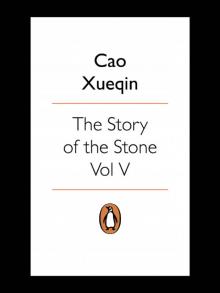 The Dreamer Wakes
The Dreamer Wakes The Warning Voice
The Warning Voice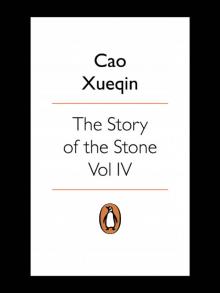 The Debt of Tears
The Debt of Tears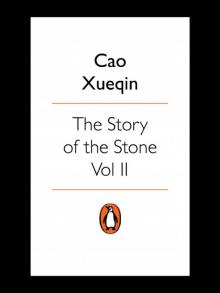 The Crab-Flower Club
The Crab-Flower Club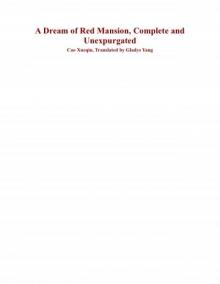 A Dream of Red Mansion
A Dream of Red Mansion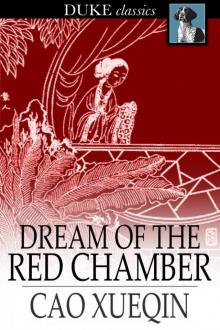 The Dream of the Red Chamber (Selection)
The Dream of the Red Chamber (Selection)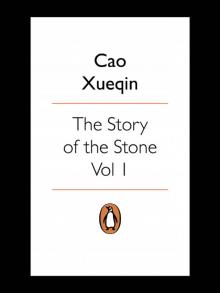 The Golden Days
The Golden Days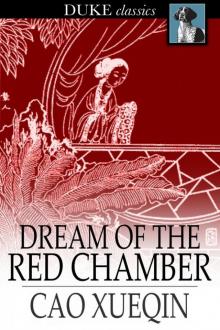 The Dream of the Red Chamber
The Dream of the Red Chamber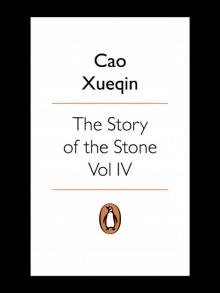 The Story of the Stone
The Story of the Stone